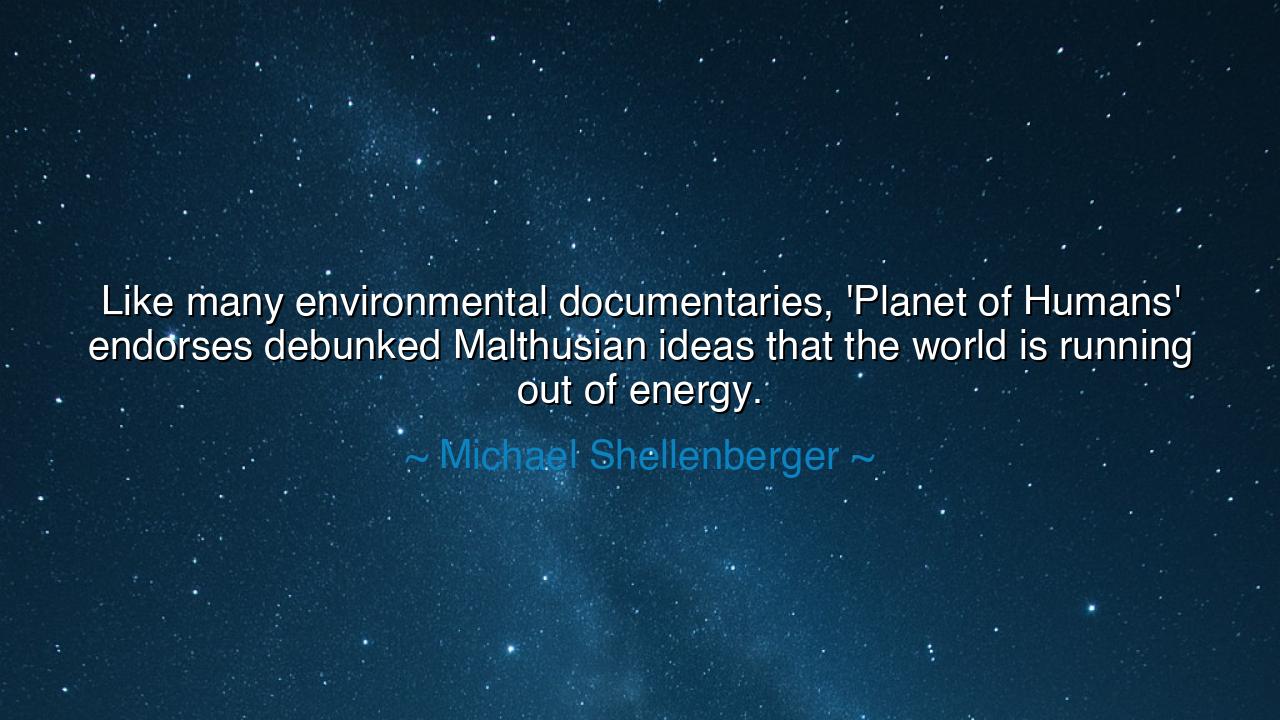
Like many environmental documentaries, 'Planet of Humans'
Like many environmental documentaries, 'Planet of Humans' endorses debunked Malthusian ideas that the world is running out of energy.






In the words of Michael Shellenberger: “Like many environmental documentaries, Planet of Humans endorses debunked Malthusian ideas that the world is running out of energy.” These words strike at the heart of a fear that has haunted humankind for centuries: the fear of scarcity, the belief that the bounty of the earth is finite and that humanity’s growth will always end in famine, collapse, and ruin. Shellenberger, however, calls these ideas what they are—debunked, proven false by the unfolding of history, where the ingenuity of human beings has again and again unlocked abundance where once only limits were seen.
The ancients themselves often trembled before the specter of scarcity. They knew drought, they knew famine, they knew the terror of empty granaries and dying fields. Yet even in their time, the great teachers reminded them that despair was not the path of wisdom. The farmer learned new methods, the builder devised new tools, the sailor sought new lands across the horizon. So too in our age, the prophets of Malthusian doom speak of vanishing energy, yet again and again the human spirit has shown itself capable of transforming the impossible into the possible, of discovering new fire for the forge of civilization.
Consider the words of Thomas Malthus himself, who in the late 18th century declared that population would always outstrip resources, condemning humanity to cycles of starvation. His voice was echoed by many in later centuries, warning of oil “peaks” and energy collapse. And yet what followed? The rise of coal, of oil, of gas, of nuclear, and of renewables—all proving that the earth held more than Malthus had dreamed. More importantly, human innovation—the ability to harness energy with ever greater efficiency—proved that mankind was not doomed to stagnation. Shellenberger reminds us that to cling to Malthus’s failed vision is to close our eyes to the truth of history.
Look too to the story of the Green Revolution in the mid-20th century. Experts warned of worldwide famine as populations grew, declaring that the earth’s soils could not feed so many mouths. Yet through the genius of Norman Borlaug and others, agriculture was transformed—yields multiplied, hunger was reduced, and billions lived who would otherwise have perished. The lesson is clear: predictions of collapse underestimate the power of human creativity. Shellenberger’s critique of Planet of Humans is rooted in this same truth: that despair blinds us, while innovation carries us forward.
The deeper meaning of his words is not a dismissal of environmental concern, but a call to reject despair. To say the world is “running out of energy” is to fall into paralysis, to imagine a cage around humanity that does not exist. For energy is not a fixed storehouse to be depleted, but a relationship between human ingenuity and the natural world. We discover, we refine, we create—and through this we find abundance where once only scarcity seemed certain. The Malthusian vision forgets this, and by forgetting, it leads people to hopelessness instead of action.
And yet, there is danger in dismissing the problem entirely. Shellenberger does not call us to arrogance, but to courage. He does not say the earth is without limits, but that humanity is not helpless before them. We must act with wisdom, with foresight, and with responsibility—choosing wisely among our sources of energy, stewarding the land, protecting the air and waters, and ensuring that progress does not trample the weak. But above all, we must act with confidence that solutions are possible, and that despair is not a plan but a surrender.
So let this teaching endure: do not be ensnared by the Malthusian fear that scarcity is destiny. Remember that history shows us otherwise. In your own life, do not despair at limits, but ask instead how to create, to innovate, to find new strength. For the human spirit, joined with wisdom and courage, is the greatest energy source of all. And remember Shellenberger’s warning: when you hear the prophets of doom declare the end of plenty, listen carefully, and answer with hope and with action—for humanity has always moved forward not by fearing the dark, but by lighting new fires.






AAdministratorAdministrator
Welcome, honored guests. Please leave a comment, we will respond soon